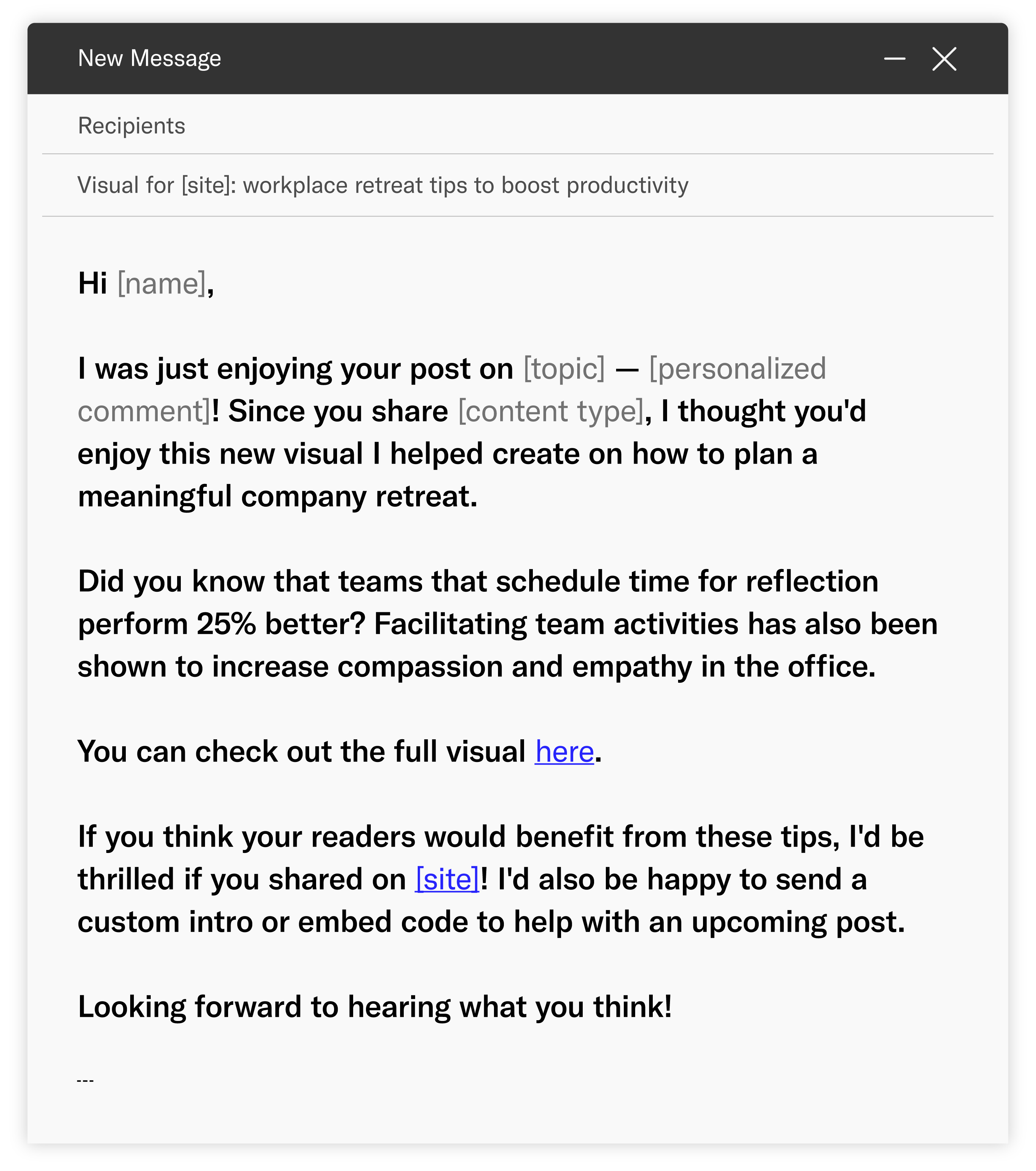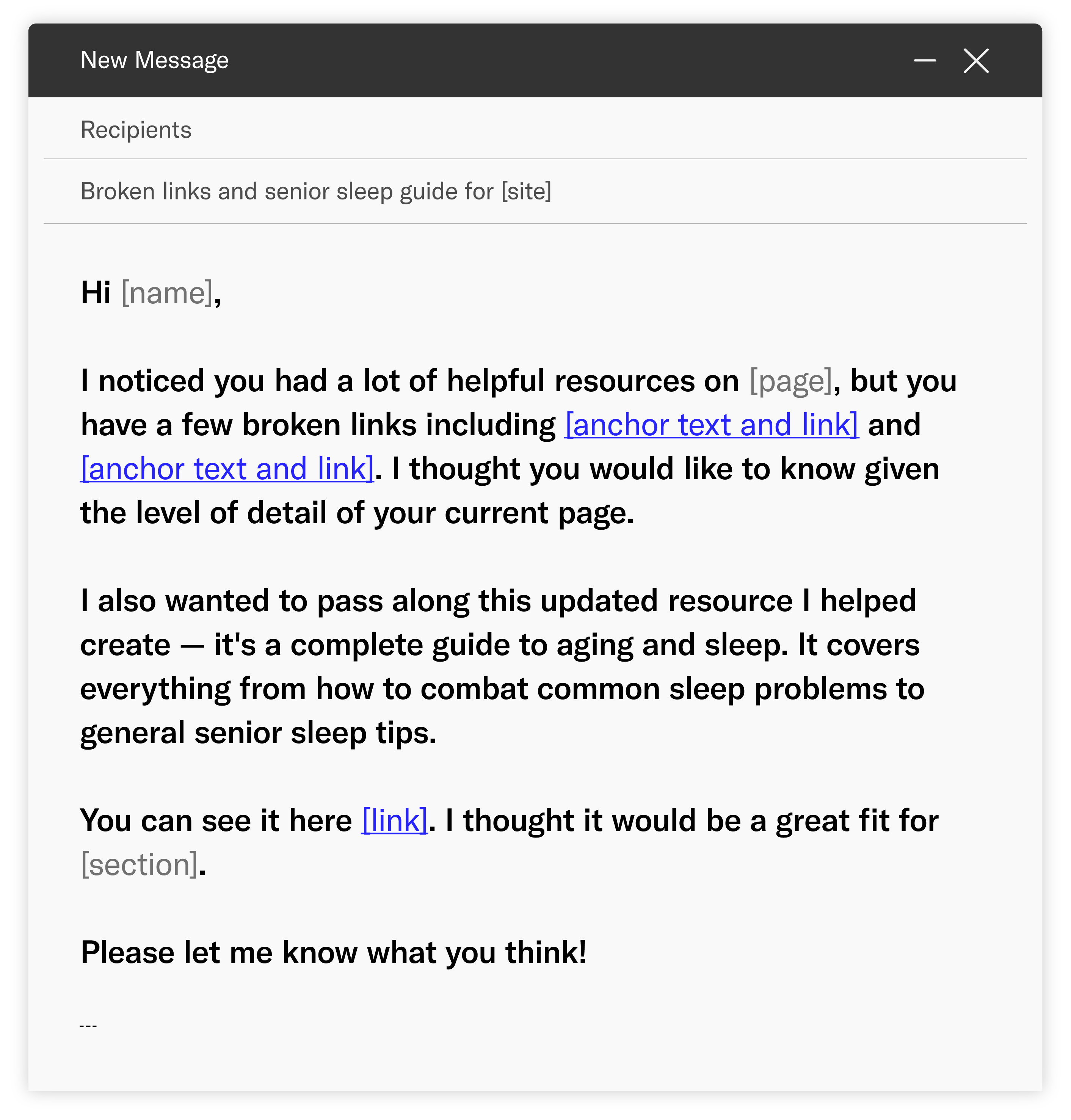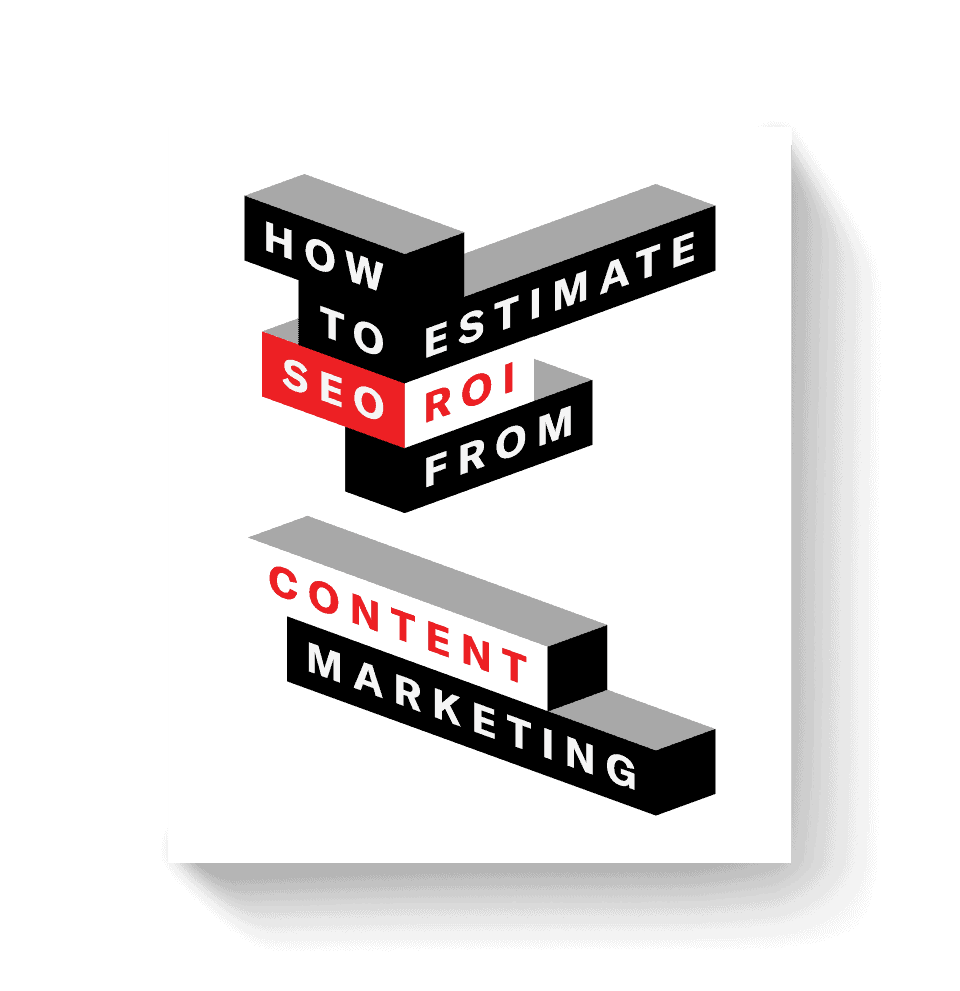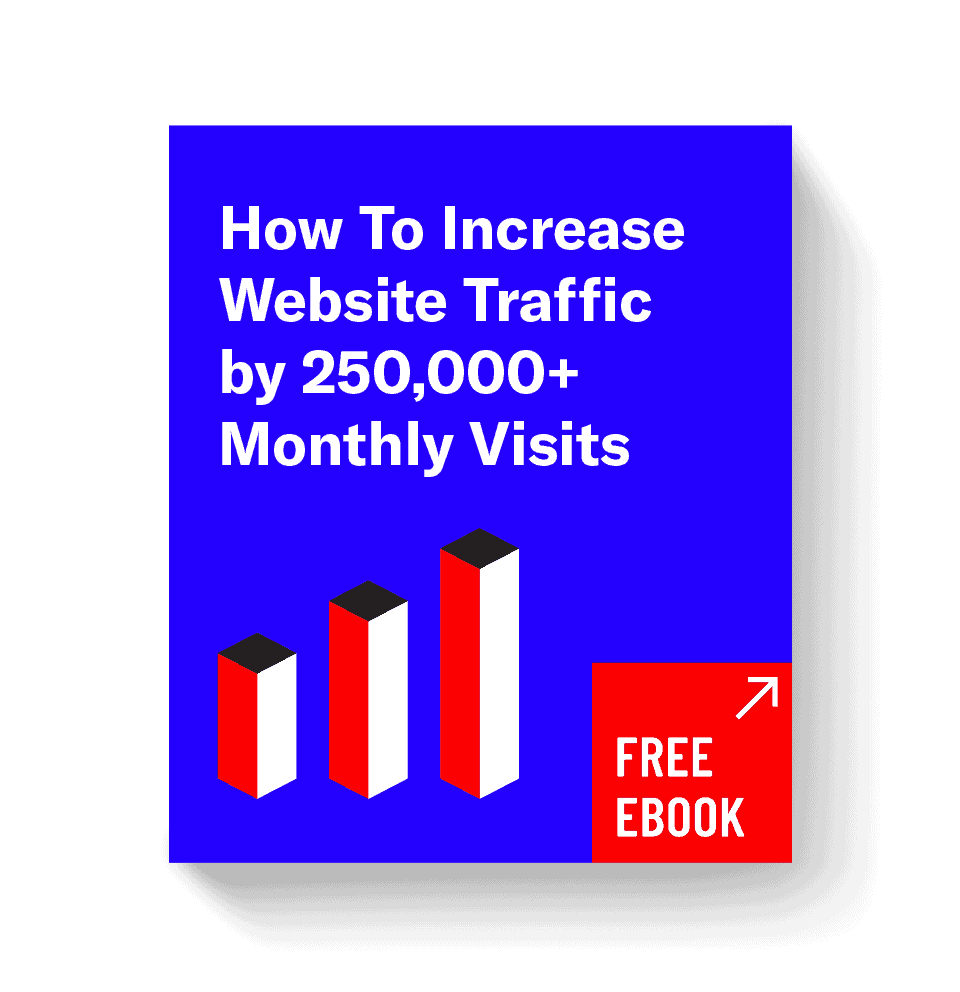Hate to break it to you, but “spray and pray” is a thing of the past for email outreach.
Email outreach is an art. Putting together your prospect list, agonizing over your subject line and sending a ton of emails takes time and care. You’ll spend a chunk of it putting together the perfect email, but all that effort may not pay off in the end if you’re hearing crickets after you hit send.
This is where a solid outreach email template comes in handy. Having go-to templates can save a lot of time and brain power. You can spend less time writing emails and more time on other parts of your marketing campaign.
As a 110-person content marketing agency, we’re sending thousands of customized emails per week. With that in mind, we have first-hand experience on what does and doesn’t work. This past month, we promoted a post in the wedding space that had an 81% open rate, 24% CTR and 13% reply rate.
We’ve put together a comprehensive list of customizable outreach email templates to save you time and actually get replies. You can start at the beginning or jump down to the email template you need now.
- A Note on Personalization
- Link Building Email Templates
- Podcast Outreach Email Templates
- Cold Sales Outreach Email Templates
- Customer Engagement Outreach Email Template
A Note on Personalization
You’ll notice that most of our templates include areas for personalized comments. This can be a compliment on a recent blog post, something interesting you learned about their brand or something you have in common with them. This proves to your prospect that you actually read their site and have a basic understanding of them and their content.
Personalization is the best way to stand out from the thousands of automated emails sent out every day. Doing some digging should also make it clear if this person will be receptive to your content.
What’s the number one rule you should follow when personalizing an email?
Don’t lie.
Don’t tell someone you loved their post if you didn’t read it. Even worse, don’t tell someone that you were a fan of their latest podcast interview if you didn’t actually like it. Bloggers and journalists have heard it all and they don’t have time for fake compliments and disingenuous one-liners.
Link Building Email Templates
Building links and promoting content typically involves lots of outreach emails. Link building is notorious for needing lots of emails only for a small return. However, lots of content marketers run into this problem because they’re not personalizing their emails and they’re likely sending emails to the wrong prospects.
There are many opportunities to build links and grow your website traffic. Take a look at our link building templates below to see how your emails should differ with each scenario.
Promoting a New Blog Post
Most of us build links by creating great content and promoting it to relevant sites who will hopefully link back to us. Blog post promotion differs depending on the type of asset you’re pitching. For this example, we’ll explain how we’d pitch an infographic.
Infographics are a common asset we create since they can easily break down information and work for most topics. Infographics still work even though a ton of people make them. To stand out, though, you’ll need to pitch your infographic to the right people who will find it useful and succinctly explain to them why your infographic is a good fit for their site.
Here’s an outreach template you can use when pitching an infographic or any new blog post.
New Message
Recipients
Visual for [site]: [describe content]
Hi [name],
I was just reading your post on [topic] — [personalized comment]!
Since you share [content type], I thought you’d enjoy this new visual I helped create on [content].
[Describe content]
You can check out the full visual here.
If you think your readers would benefit from these tips, I’d be thrilled if you shared on [name]! I’d also be happy to send a custom intro or embed code to help with an upcoming post.
Looking forward to hearing what you think!
…
In this example, we created an infographic on workplace retreats for a small business financing site. This template had a 53% open rate, 26% CTR and a 15% response rate.

Guest Post
Guest posting should be done with intention and caution. Google’s John Mueller reiterated in 2020 that links in guest posts are largely ignored by Google’s algorithms since guest posting for links results in unnatural links.
However, we don’t think you should completely axe your guest posting campaign. Guest posts should represent sites giving a true “vote” for the content on your website while also being relevant to the prospect’s site. Put simply, if you write a post about bath bombs, a guest post on the topic makes more sense on a lifestyle blog than a bee keeping site. These are just a few dos and don’ts of guest posting you should follow to abide by Google’s rules and avoid unnatural links.
If you’re going after guest posts, you should check for contributor guidelines. The site owners may have a process for guest post requests and are much more likely to reject you if you don’t follow them.
Examples include specific text in the subject line, writing samples and topic suggestions. Some may require you to send in the completed guest post for consideration.
Here’s an example outreach email template you could use if you’re submitting a guest post request.
New Message
Recipients
Guest post idea for [site]: [describe content]
Hi [name],
I just read your post on [content] and [personalized comment].
I saw that you’re accepting guest posts and I’d love to write one on [topic]. Here are some ideas I have:
- [topic]
- [topic]
- [topic]
Here are some of my best writing samples on [topic] to give you an idea of my writing style:
- [writing sample]
- [writing sample]
Do you think one of these ideas is a fit for [site]?
…
Broken Link Building
Broken link building is a strategy that focuses on — you guessed it — broken links. You look through existing resource pages to see what kinds of content you can create to improve and replace dead links.
Many webmasters may not be receptive since broken link building is a well-known link building strategy. To avoid this, ensure that your content is relevant for both their resource page and brand. You should also double-check that other links on their page are similar to your site, not only .edu, .gov and other authoritative sites. Some sites only link out to sites like this.
LinkMiner is a great extension to use to highlight broken links. Depending on the tone of their reply and the context of the page, you may be able to ask for a homepage link.
Below is a broken link building template we’ve used for many campaigns.
New Message
Recipients
Broken links and [content] for [site]
Hi [name],
I noticed you had a lot of helpful resources on [page], but you have a few broken links including [link anchor text and link] and [link anchor text and link]. I thought you would like to know given the level of detail of your current page.
I also wanted to pass along this updated resource I helped create on [topic]. [Briefly describe content].
You can see it here [link to new resource]. I thought it would be a great fit for [section].
Looking forward to hearing your thoughts!
…
We promoted a guide on aging and sleep for a mattress company using the below template. This template yielded a 57% open rate, 43% CTR and 27% response rate.

Resource Page
Some people use “broken link building” and “resource page outreach” interchangeably. For this post, we are referring to two different types of outreach.
Resource page outreach is what you may revert to if you find a page without broken links, but still looks like a good fit for your resource.
We’ll slightly tweak the previous template to match our shift. Here’s what a resource page outreach template might look like.
New Message
Recipients
New resource for [site]: [describe content]
Hi [name],
I noticed you have a lot of great resources on [page] — [personalized comment] — so I thought you’d appreciate a new resource for [topic].
[Describe content]
You can see the full guide here: [link].
If you think this would be a valuable resource for [site], I’d love for you to add it to your page. Looking forward to hearing your thoughts!
Best,
…
We’ve used the following template for a life insurance company for a college finance guide. This template had a 44% open rate, 11% CTR and 6% reply rate.

New Data Outreach
Promoting new proprietary data is one way to show off your company’s expertise and receive coverage for your brand.
The key to this type of outreach is to find the right reporter. Most journalists have had enough of PR pros and content marketers sending irrelevant pitches, so make sure you get yours right the first time.
You’ll also need to quickly grab the journalist’s attention and explain the main points of your research. Any emails to journalists should lean on the AIDA (attention, interest, desire, action) model. If you’re an SEO specialist, then you should learn a few key PR strategies to improve your outreach to journalists.
Here’s an outreach email template you can use to pitch your data to journalists.
New Message
Recipients
NEW DATA: [stat]
Hi [name],
I just read your piece on [content] –– [custom].
Since [personalized tie-in], I thought you’d be interested in our recent survey that revealed [main takeaway].
We surveyed [sample size and sample characteristics] and found:
- [data point]
- [data point]
- [data point]
Check out the full results here: [link]
I thought this would make a great story for [site] on [story idea]. I’m happy to send over the raw data or visuals if you are interested.
…
Below is a short and sweet template we used when promoting a survey on retiree regrets for a credit repair company. This outreach email template works best if your data is straightforward and you can quickly sum up the main points. This template received a 47% open rate, 26% CTR and 14% reply rate.

If you have a more robust data set or multiple strong points, you can try a longer template. The key is to use bullets and bolding so it’s easier to scan. We created this template for a survey on healthy lifestyle choices for a health resource site. This template had a 61% open rate, 17% CTR and 10% reply rate.

Link Reclamation
Link reclamation and link moves are a couple strategies to earn links from organic press mentions. We’ll first look at link reclamation. To look for link reclamation opportunities, search for pages with unlinked mentions or broken links to your site and ask for a link back.
You can first start with a search for: “brand” + “-brandwebsite.com” to find unlinked mentions of your company. You can also use Ahrefs’ unlinked domain feature in their content explorer tool or Moz’s Fresh Web Explorer. Google Alerts is a free and simple way to get reports on mentions of your brand, product, service and anything else that other sites may mention.
Here’s a link reclamation template we used for a fashion startup that had a 85% open rate, 42% CTR and 46% reply rate.
New Message
Recipients
Uncredited mention on [site]
Hey [name],
I noticed you recently mentioned [brand] in your article, here: [link].
Thanks for including them — [personalized comment on the article]!
I’m reaching out to see if it was possible to add a link to your homepage: [link]. I think it would add context and value for your readers and of course, would be much appreciated as well.
Thanks again!
…
Link Move
On the other hand, link moves focus on updating linked mentions to more relevant pages. This can be a valuable strategy for your brand, but like all other tactics, you must wisely choose which link move opportunities to pursue.
You should first ask yourself if the update is genuinely valuable for a reader. For example, if a site mentions your homepage while talking about one of your products, it does make more sense for them to link directly to that product page.
We used this link moves template for a delivery service company. This template had a 73% open rate, 41% CTR and 38% replies.
New Message
Recipients
Correction for [name]: link request
Hey [name],
I noticed you recently mentioned [brand] in your article on [topic], here: [page link].
We’re glad to see you mentioned us!
I’m reaching out because I wanted to see if you could update that homepage link to our [page name with link] page, to better serve your readers.
I’m sure they would appreciate being able to see more accurate results for [reason]! Let me know if that’s something you could update, I would really appreciate it.
Thanks again!
…
Follow Up Emails
Follow up emails are tricky since it isn’t clear when you should or shouldn’t follow up. Many journalists aren’t fans of the follow up since it clogs their inboxes. Bloggers are fed up with follow ups, too.
However, emails do sometimes get lost in inboxes and some bloggers or journalists do forget to reply. Here are a few signs our team has found that signal when you should and shouldn’t send that follow up.
When you should follow up:
- The person you emailed is on vacation and didn’t explicitly ask you not to follow up.
- You know your email was opened and/or a link was clicked, but they didn’t reply. You can get this data with an email outreach software like Buzzstream.
- The blogger or journalist expressed interest in your offer, but hasn’t replied or explained that they’d be slow to respond.
- You sent custom copy or assets for them to use and you haven’t heard back from them in a while.
- You sent custom copy or assets for them to use, you followed up once because you haven’t heard back from them, and still haven’t heard from them after a long period of time.
When you shouldn’t follow up:
- The blogger or journalist specifically requests that you don’t follow up and posts that clearly on their site.
- The person you emailed gave you a specific time they’d follow up and it hasn’t passed that time.
- The blogger or journalist did not open your email.
- It’s only been a few days since you sent your email.
- The blogger or journalist expressed interest, but explained they’d be slow to respond for a period of time (and it’s not past that period of time).
Below are a few follow up emails you can send if you’re confident you won’t annoy the person on the other end of your message!
Additional Assets
You can attempt to entice a blogger or a journalist by sending over something new that you didn’t mention in your first email. If your post features great visuals, you can include a screenshot or a full image they may have missed. If your post features photography, consider sending over some photos you took that didn’t make it in the post.
This tactic also works if you’re using a “two-step” process for your email outreach. Two-step outreach is when you send a pitch without a link to your content. Then, you follow up with a link and some extra assets from your post.
Below is a follow up email template you can use to offer a new asset.
New Message
Recipients
Subject Line
Hey there, [name],
Hope you’re having a good week! Did you have a chance to check out the [content and link] for [site]?
Let me know if you’re open to sharing this with your readers! I’d be happy to help with a post, if so.
[image]
…
We used this follow up template when we promoted a post on making saving fun for a personal finance site. This had a 93% open rate, 17% CTR and a 7% response rate.

Pitch Different Content
You might get a reply if they didn’t like your post. However, they might be interested in the general topic you described in your subject line if they opened your email.
Pick out a few of your past posts that are a good fit for the site you pitched. Double-check that the shareable assets on these other posts match the site. For example, if the site has no infographics on their site, it might not be a good idea to pitch an infographic.
Here is a quick way to follow up with different resources.
New Message
Recipients
Subject Line
Hey [name],
I’m following up to see what your thoughts were on the [content] I sent over last [time period]. I also have a few other posts on [topic] that could also be helpful for [site]’s audience.
- [post 1 with link]
- [post 2 with link]
Let me know if any of these are a fit! I’m happy to send over custom copy and the visuals if it makes sharing easier.
…
Here’s a template we’re currently using for a recent post on the voice of the customer for a customer experience software company.

Timeliness
Time may be on your side if you pitched seasonal or time sensitive content. Posts tied to holidays or seasons give you a natural reason to follow up. Other types of time sensitive content may be tied to current events like a national election or recent weather changes.
Below is one way you can nudge a blogger or a journalist about the timeliness of your post.
New Message
Recipients
Subject Line
Hey there, [name]!
[Season/current event] is almost here! Wanted to follow up to see if my [content] was a good fit for a timely post on [topic]?
If you missed them, you can check them out here.
Would you be open to a guest post on [topic]? I’d be happy to draft one for your readers if you think they’d find it valuable. Just let me know!
…
Here’s a follow up template we used for a post on back to school morning routines for an insurance comparison site.

Your Knowledge or Your Brand’s Expertise
Finally, you can use a follow up to demonstrate your knowledge in the topic. Showing your personal expertise can establish some credibility, especially if you offered to write a guest post for them.
This can be as simple as adding a line to your email saying linking to your portfolio or company profile. You can also add more context like, “I’ve worked in [industry] for [number] years and I’d love to share some of the things I’ve learned.”
Here’s an outreach email template you can use to introduce your expertise and offer a guest post.
New Message
Recipients
Subject Line
Hey [name],
I wanted to follow up on the [content] I recently sent you. I’m happy to put together an original post on [topic] if that makes sharing easier for you.
Here’s an example of a post I’ve written on [topic]. You can check it out here [link to guest post].
So far, it’s gained a good amount of [traction/views/social shares] for [site].
Here are a few titles I had in mind for a post on [site].
- [title]
- [title]
- [title]
Let me know if you think any of these are a fit and I can get started right away on a draft.
Thanks!
…
You wouldn’t need to sell your writing expertise to a journalist since they’re always the ones writing the story. However, you can use this opportunity to quickly explain your company’s expertise on the topic of your content. This is helpful for lesser known companies or if you have knowledge in areas most don’t know about.
You can also add a quick line like, “You can also learn about [brand]’s background in the [industry] industry here,” and link to your about page or an informational page that explains your work in that area.
Podcast Outreach Email Templates
Podcasting is a great way to demonstrate your expertise on different topics, connect with other thought leaders and show off your team’s personality. You can also repurpose blog content for your podcast and vice versa. Here are a couple outreach email templates you can use to grow your audience and reach.
Podcast Interview Invite
Lots of podcasters start with their core set of hosts (or host!) for their first couple seasons. As your podcast gains popularity, you should start looking at others in your niche who would be a good fit for your podcast.
Instead of a cold email, you can more casually DM them on Twitter or LinkedIn to see if they’re interested at all in a pitch. Some people prefer this method if they’re busy or more active on other platforms.
Just like link building emails, you should personalize them, do a great job at succinctly explaining why they’re a great fit for their show and explain why their expertise is valuable for your audience. Similarly, you should also check their site to see if they have a process in place for interview requests.
If you’re sending an email, you can use this email template to break the ice.
New Message
Recipients
Podcast guest opportunity for [name]
Hey [name],
I’m [your name] and I’m the host of podcast. I talk about [brief explanation of topics covered].
I’ve [read/listened] to your insight on [topic] and I know my listeners would love to get your advice on [topic]!
Here’s an episode on [topic] that I think you’d like: [link]
Thanks! Look forward to hearing from you.
…
Here’s an example of what we’ve sent to potential podcast guests!

Get On a Podcast
Another way to promote your podcast is to be a guest on another similar podcast. Since we focus on topics related to content marketing, we could ask a similar content marketing podcast if they’re looking for guests.
We could also look for podcasts related to our specific service offerings like SEO and design to feature our expert team members in those departments.
This bears repeating — please don’t tell them you’re a “big fan of their podcast” if you’ve never listened to a single episode! Keep your personalization genuine and honest.
Here’s something you can send if you want to be a guest on another podcast.
New Message
Recipients
Episode idea for [site]: [topic]
Hey, [name]!
I’m [your name] and I’m the [title] at [brand]. I just listened to your episode on [topic] and [personalized comment].
I’m reaching out because I’d love to be a guest on !
[Brief explanation of your expertise + value you bring to their audience ]
I think my experience would be helpful to your audience because [reason]. Here are a couple past podcast interviews I did on [topic]:
- [episode]
- [episode]
I put together potential topics we could chat through:
- [topic]
- [topic]
- [topic]
Do any of these seem like a fit?
Thanks! Look forward to hearing from you.
…
Cold Sales Outreach Email Templates
Sales outreach campaigns are as delicate as they are important for a business. Unfortunately, lots of emails end up in or get marked as spam. Here at Siege, all of our team members (even me!) are sent tons of irrelevant sales emails that end up in spam.
Although we can’t ignore the thousands of emails sent per day, sales outreach isn’t all that bad. Some of the best sales reps we’ve seen have taken the time to clearly understand our services, our customers and the value they’d bring to us.
Now that I have this opportunity, please let me say this: I’m unfortunately not the person to talk to if you have a great accounting candidate for Siege or want to sell Siege your video services, nor am I the person to ask if I’m interested in free guest posting sites (I’m not).
We’ve rounded up a few examples of emails that can help you build a connection with potential customers and warm up your leads.
Congratulations
Who doesn’t like to be congratulated? A recent achievement by a company you’re eyeing can be a genuine way to connect. The key for this template is to not make it about you.
Some people like to use this opportunity to seek advice as a way to build a connection. There’s nothing wrong with that approach, but this ask should be mutually beneficial. Asking if you can “pick their brain” can be seen as thoughtless and annoying, especially if you’re using it as a bait-and-switch to segue into a sales call.
Here’s a quick note you can send over on a recent achievement. Alternatively, you can congratulate them on Twitter or LinkedIn for a more casual approach.
New Message
Recipients
Congratulations [name]!
Hi [name],
Congratulations on [company]’s recent accomplishment! I saw on [where you saw the accolade] that you [accolade].
I’m [name] and I’m from [company]. I work often with folks in [industry] and I wanted to say “hello” and “congrats!”
I look forward to seeing all the great work you and [company] will do for the industry.
…
Fix a Problem
Another way you can start a conversation is by pointing out an issue you find on their website. This doesn’t need to be something your company can fix. It can be as simple as pointing out a broken image on their site or an issue you had navigating their FAQ section. This is another way you can be genuinely helpful, build a connection and not come off too salesy.
Use this template to politely point out an issue you found.
New Message
Recipients
[error] on [company]’s site
Hey, [name]!
I was going through your site and really loved [genuine compliment on their site]. Though, when I got to [page], I noticed [error].
I’m happy to send over some quick fixes or hop on the phone to explain!
Alternative: I’m not an expert on [error], but I have a colleague who can help. Let me know if you’d like me to introduce you!
…
Expanding Team
Looking for new hires is a sign that a company is growing in a particular department. If your product or service falls under the same umbrella, this can be a good opportunity to reach out.
Here’s an example of how you can reach out to them.
New Message
Recipients
Help for [company]’s [department] team
Hi [name],
I saw that [company] is hiring for your [department] team. I’m reaching out because [company] can help with the [department]’s growth!
[Briefly explain your product or service and how it relates to them]
Do you have availability this week for a 15-minute call on how we can help [company]’s [department] team?
…
Something in Common
Doing your research can pay off! Sites like Twitter and LinkedIn are useful tools to find things in common with a potential customer. You may have graduated from the same school, grew up in the same hometown or have a mutual connection. Use this as an excuse to start a conversation.
Below is one way you can bring up something you have in common with a potential customer.
New Message
Recipients
Connecting with a fellow [connection]
Hi [name],
I was going through LinkedIn the other day and found out we both [connection]. What a small world! Can you believe [something relevant to your connection]?
I saw that you also do [job role] at [company]. Since you’re a fellow [connection], I’d love to offer any help I can! My team at [company] could help you [briefly explain your service].
Let me know! Either way, happy to connect with another [connection]!
…
Case Study
Case studies are great tools to demonstrate your success with different campaigns and customers. You can use past case studies to establish rapport with your leads and prove that you understand their market.
Here’s an email template you can use to send a case study to a potential customer.
New Message
Recipients
How we helped [company] achieve [stat/accolade]
Hi [name],
The most common struggle we hear about [industry] is [difficulty].
We’ve actually worked with a company similar to yours, [company], to solve [problem]. [Brief explanation of how you helped].
We put together a quick case study that demonstrates how [company] improved [metric].
You can find our case study here: [link]
I’d love to talk about how we could also help [company] with [difficulty]. Do you have 15 minutes to spare this [day]?
…
Similar Product
An easy way to segue into a sales conversation is to mention a product or service they’re using that is similar to your product. With this tactic, you know that they already have a need for your product and you can easily explain why your features outshine those of your competitor.
Here’s one example of how you can make that connection.
New Message
Recipients
New [product] platform for [company]
Hi [name],
I was checking out [company]’s site and saw that your team uses [competitor] for [service].
My company [company] also helps companies like yours with [service]. [Quick description of how your product is better].
Are you available to hop on a quick call to learn about how our service can help [company]?
…
Set Up a Phone Call
The end goal of most sales outreach emails is to get someone on the phone. Landing a phone call isn’t tough if you’ve already made a few touch points.
Here’s a quick template you can use when you want to set up a phone meeting.
New Message
Recipients
Phone meeting with [company]
Hi [name],
I was looking into your site and noticed [relevant connection to your product].
[Company] actually works on [offering] and I think we could help you [goal].
I’m happy to set up a quick phone call to chat about our services and how we can help [company].
Do any of the following dates and times work for you?
- [date and time]
- [date and time]
- [date and time]
I can also send over a few more time slots if needed. Let me know what works and if you have any questions!
…
Customer Engagement Outreach Email Template
We all know by now that it’s much cheaper to retain customers than it is to earn new ones. Customer engagement for product-based and service-based organizations is crucial to continue delivering great service to your customers and knowing what areas to improve.
We actually have experience with both products and services. In addition to our main agency services, we have a content marketing course called siegelearn. We go over topics in three areas: outreach, content marketing and SEO.
We’ve grown a lot in the past eight years and have had plenty of customers come and go. In that time, we’ve picked up a thing or two about engaging customers. Take a look at some of these customer engagement email templates.
Subscriber Welcome Email
Many customers start off as subscribers to your newsletter. You can use this first email to make a good first impression on your subscribers, set expectations and even nudge them with a free offer. There are many elements that go into a welcome email like design and layout. For now, we’re going to focus on the copy.
Here is a general template you can use for your welcome email, but keep in mind that it can vary greatly based on the goal of your first email.
New Message
Recipients
Welcome to [company]
Welcome [name]!
We’re so excited to have you here. Our goal is to [explain the goal of your content].
Here’s a link to one of our most popular [content type]: [link]
You can browse through our [blog/podcast episodes/etc.] to get even more tips on [topic].
Connect with us [social media handle] on [the social platforms you’re on].
We’re here to help! Feel free to reply if you have any questions for us.
…
Customer Survey
A customer survey can get your company quick feedback from customers who may not have a lot to say or are new. You can use a survey to check on their experience so far with your services or as a way to gather market research for internal use or data studies.
Below is an email template you can send to customers for an upcoming survey.
New Message
Recipients
We need your help with [problem]
Hi [name],
We’re working on [purpose of survey] and need your help! Can you take this really quick survey on [topic]?
[link to survey]
We’re working on improving [what you’re improving and why]. We’d love to get your honest feedback to improve yours and other customers’ experiences with [company].
Thank you for any help you can offer!
…
Customer Testimonial
Customer testimonies are great assets for clients you’ve had for a long time. In the past year, we’ve made a stronger effort to ask our clients for testimonials on sites like Clutch to get another avenue for feedback. Testimonials also serve as an additional platform to show potential customers the value of our work with past and existing clients.
Here’s a template you can use to request a customer testimonial.
New Message
Recipients
Thanks for choosing [company]
Hi [name],
I wanted to take some time to thank you for working with us on your [project] campaign. It’s been great working with you and your team! We were also excited to recently celebrate [milestone].
Since [campaign] has gone so well, we wanted to ask if you’d like to submit a testimonial for our website. You can see examples of past testimonials here [link].
Let us know if this is something you’re interested in and I can get you set up!
Thanks again for continuing to partner with us!
…
Customer Exit
Unfortunately, customers need to exit for a number of reasons. The coronavirus pandemic is an unprecedented example of a compelling reason for customers to exit.
Before they go, take the time to genuinely thank them for choosing you and ask for feedback. You can informally ask them for feedback via email, ask to hop on a call or send them an exit survey.
Here’s something you can send to customers who choose to exit.
New Message
Recipients
Exit feedback request for [company]
Hi [name],
Thank you again for giving [company] a chance for these past [time they were with you]. We enjoyed working and learning with your team.
We’d like to ask if you had any feedback for us on our [product/service].
We’d love to know what we did well and where we can improve to better serve customers in the future.
…
Outreach email templates like these are a big time-saver, but you can’t just plug-and-chug a few hundred emails with a single template and call it a day. You need to customize emails and choose templates based on your end goals. In other words, don’t come off desperate, salesy or robotic. Remember that you’re talking to a human on the other side of that email!
So, what’s the biggest takeaway? Copied-and-pasted cold emails are out. Personalized, well-researched and valuable outreach emails are in and they’re here to stay.




